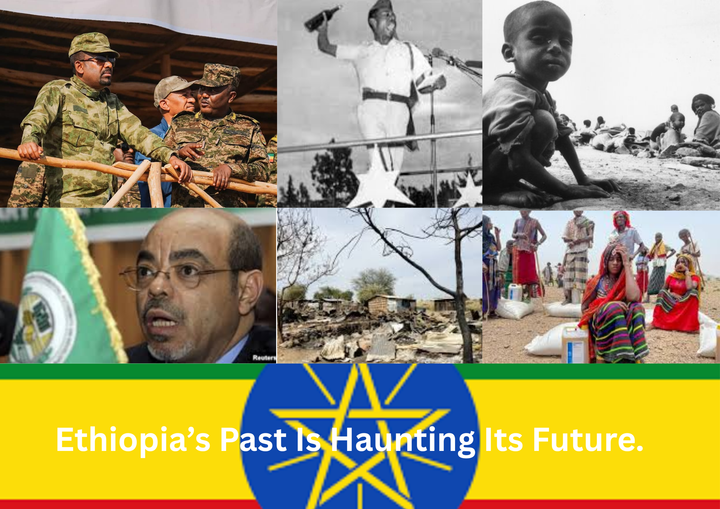Michael Rubin’s Lethal Ignorance: Interventionist Policies That Destabilize Nations
Michael Rubin's interventionist policies, defended as "principled advocacy," have destabilized nations like Iraq and Libya while misrepresenting Eritrea and the Horn of Africa. Evidence exposes his flawed agenda

Lethal Ignorance: Interventionist Policies That Destabilize Nations and When Political Ineptitude Meets High-Stakes Lobbying underscores Michael Rubin's deeply flawed record as an interventionist. His policy recommendations in Iraq, Libya, Syria, and Iran reveal a consistent pattern of reckless misjudgments, repeatedly contributing to regional instability and widespread turmoil.
Rubin often cloaks his hawkish agenda in the rhetoric of humanitarian justice and democracy promotion, concealing a deeper alignment with the expansionist interests of the United States and Israel. This alignment is particularly evident in his 2014 Commentary article, "How Lobbyists Reflect Countries They Support," where he explicitly defends pro-Israel lobbying, arguing that it aligns with American values and national security. By equating his work with legitimate advocacy efforts from groups like Greenpeace and human rights organizations, Rubin attempts to sanitize his role in promoting interventionist policies.
The deceptive nature of Rubin's approach becomes evident when examining his portrayal of lobbying. While framing it as principled advocacy, he simultaneously supports policies that have caused significant regional destabilization and human suffering. His comparison of pro-interventionist lobbying to environmental and human rights advocacy illustrates how he skillfully legitimizes hawkish foreign policy under the guise of principled engagement.
This recurring pattern—advocating interventionist policies while cloaking them in justifying rhetoric—exposes how so-called expert analysis can advance destabilizing geopolitical agendas.
Rubin’s focus on the Horn of Africa, particularly Eritrea, reflects an extension of the interventionist tactics that characterized his Middle East policy work. His use of academic and policy platforms to misrepresent regional dynamics continues this pattern, showing a concerning continuity with his earlier efforts.
In analyzing the Horn of Africa, Rubin often employs the same problematic approach seen in his Middle East recommendations—crafting narratives that conflict with documented evidence and official assessments. For instance, his depictions of Eritrea frequently contradict U.S. State Department and Treasury findings. Recent Treasury Department sanctions related to the conflict in Sudan reveal a far different picture than Rubin’s narratives, identifying other actors and dynamics as key contributors to the unrest.
The gap between Rubin's claims and verifiable evidence raises critical doubts about the reliability of his analysis and the true agenda it serves. His positions at think tanks and academic institutions provide him with platforms to disseminate these misrepresentations, which may appear as credible expert analyses but often amount to advocacy for interventionist policies dressed up as scholarly work.
This approach is particularly troubling because it risks misleading policymakers and the public about the intricate realities of the Horn of Africa. Such misrepresentation could result in policies rooted in flawed assumptions rather than a factual understanding of the region's dynamics.
Scrutinizing Expertise: The Paradox of Credentials and Agenda
Michael Rubin’s impressive academic, military, and policy credentials call for a closer, critical examination of his track record. His career spans prestigious roles—from studying Iranian Studies at Yale to serving with the Bush administration’s Coalition Provisional Authority, educating at the Naval Postgraduate School, and his current position at the Middle East Forum. Despite these accomplishments, Rubin’s consistent advocacy for interventionist policies has often resulted in regional instability, revealing a troubling pattern.
While Rubin’s resume boasts affiliations with renowned institutions, these credentials must not shield his policy recommendations from thorough scrutiny. His involvement in shaping Iraq policies during the Bush administration, which culminated in catastrophic consequences for the region, highlights a stark disconnect between academic expertise and practical, sound policy judgment. This period in his career exemplifies his broader pattern of supporting interventionist strategies across various regions.
Rubin’s transition from academic research to policy advocacy illustrates how institutional credibility can sometimes lend undue legitimacy to questionable policy prescriptions. For instance, his current work on the Horn of Africa—mainly his targeted focus on Eritrea—mirrors the same problematic patterns seen in his Middle East analyses. He frequently advances narratives that contradict documented evidence and official findings, as demonstrated by recent U.S. Treasury Department assessments of regional conflicts.
This paradox between Rubin’s distinguished credentials and his controversial policy advocacy underscores a critical lesson: while noteworthy, institutional affiliations and academic achievements do not inherently validate an individual’s analysis or agenda. In Rubin’s case, his professional background has often been a platform for advancing interventionist policies that have exacerbated instability rather than fostering evidence-based, sustainable solutions.
Recognizing this disconnect is essential when assessing Rubin’s current policy recommendations. His work regarding regions such as the Horn of Africa often diverges significantly from verifiable evidence and official assessments, raising questions about his analytical reliability and the motives underlying his advocacy. These inconsistencies make it all the more important to rigorously evaluate the policies he promotes, ensuring that decision-making is informed by factual understanding rather than personal or ideological bias.
Persistent Agenda: Exposing the Contradiction Between Evidence and Advocacy
Michael Rubin’s continued advocacy for regime change in Eritrea, even during periods of U.S.-Eritrean alignment under the Trump administration, underscores how his analysis often prioritizes predetermined agendas over shifting geopolitical realities. His 2019 article in National Interest, which sought to undermine the Ethiopia-Eritrea peace process, exemplifies this pattern. It highlights how his policy recommendations frequently contradict historical facts and ongoing diplomatic developments.
Rubin’s mischaracterization of Eritrea’s independence struggle as merely a "guerrilla movement" reflects a deeper pattern of historical distortion. This oversimplification dismisses one of Africa's most sophisticated and impactful liberation efforts. Eritrea's political-military transformation spanned six decades, successfully challenging multiple global superpowers and their regional allies.
Under the leadership of President Isaias Afwerki, Eritrea achieved remarkable feats that defied expectations. The country withstood pressures from multiple U.S. administrations—from Kennedy to Biden—while overcoming challenges posed by U.S.-backed Haile Selassie and Soviet-supported regimes. Eritrea also developed a self-reliant resistance model that fundamentally disrupted Cold War paradigms. These achievements extended far beyond military victories to include the creation of sustainable political and social institutions, maintaining stability even as neighboring states faced considerable turmoil.
President Isaias’s strategic leadership—navigating and overcoming threats from U.S., Ethiopian, Israeli, and Soviet-Cuban-Ethiopian forces—remains unparalleled in modern political-military history. Yet, Rubin persistently downplays these accomplishments, even when they align with U.S. interests. This tendency reveals how personal biases can overshadow objective analysis, distorting policy recommendations.
The disconnect between Rubin's advocacy and Eritrea's documented historical achievements highlights why his analysis warrants rigorous scrutiny. When allowed to influence policy discussions, his narratives risk misrepresenting critical regional dynamics in the Horn of Africa, leading to flawed and potentially harmful policy decisions.
Exposing the Evidence Gap: How Selective Narratives Contradict Documented Reality
Michael Rubin’s accusations against Eritrea regarding Somalia and Sudan reveal a troubling pattern of selective criticism. These claims deliberately ignore established diplomatic agreements and documented evidence of Eritrea’s cooperative regional efforts. For example, his allegations that Eritrea was "trafficking Somali recruits" and "arming Sudanese tribes" disregard the formal tripartite agreement between Egypt, Eritrea, and Somalia. They also starkly contradict U.S. Treasury Department findings about the true sources of regional destabilization.
The Treasury Department’s January 2025 sanctions identified a sophisticated UAE-based network directly supporting the RSF’s military operations in Sudan, which the U.S. has now classified as genocide in Darfur. This operation revolves around Capital Tap Holding, a UAE-based company managing 50 subsidiaries across ten countries. Its activities include complex gold trading through AZ Gold, funneling millions of dollars via front companies designed to evade sanctions, and orchestrating military-related cargo imports through subsidiaries such as Capital Tap Management, Capital Tap General, Creative Python, and Horizon Advanced Solutions.
At the center of this network, Abu Dharr oversees multiple UAE-based entities facilitating financial transactions for RSF leaders, including Hemedti’s brother Algoney, the RSF’s procurement director. This well-documented network of support contradicts Rubin’s unsubstantiated accusations of Eritrean involvement in regional destabilization.
The disparity becomes even more evident when examining Eritrea’s diplomatic initiatives. For instance, President Isaias Afwerki’s November 26 meeting with Sudan’s Sovereign Council Chairman, General Abdel Fattah al-Burhan, reaffirmed Eritrea’s principled stance: Sudan’s challenges require internal solutions supported by neighboring states. This approach directly opposes Rubin’s characterization of Eritrea as a destabilizing force.
The contrast between the U.S. Treasury’s detailed findings on UAE-based support for the RSF and Rubin’s persistent campaign against Eritrea raises serious questions about the credibility and motives behind his analysis. While Rubin has labeled Eritrea a "criminal enterprise," official U.S. investigations point instead to specific UAE-based networks, complete with documented financial transactions, company names, and individual actors.
By focusing on Eritrea, Rubin misrepresents the nation’s role and obscures the complex realities of regional cooperation and conflict resolution efforts in the Horn of Africa. The stark gap between evidence-based findings and Rubin’s targeted accusations highlights how narratives about regional dynamics can persist despite being contradicted by documented reality. Such narratives often serve specific agendas rather than contributing to a factual and balanced understanding of regional stability efforts.
Defamation and Disinformation: The Dangerous Targeting of the Eritrean-American Community
The accusations against Eritrea and its diaspora represent a troubling combination of disinformation and xenophobia. By labeling Eritrean embassies as “criminal enterprises” and accusing them of systemic extortion, these unfounded claims criminalize an entire immigrant community. This is particularly concerning given the Eritrean-American community’s remarkable achievements and strong civic contributions in the United States.
The Eritrean-American community exemplifies successful integration and meaningful contributions to American society. Many individuals have excelled in medicine, technology, education, and business. With advanced degrees, thriving enterprises, and active participation in local and national civic life, this community reflects the best of America’s immigration story—a dual commitment to American citizenship and cultural heritage.
What makes these accusations especially harmful is their attempt to cast legitimate diaspora engagement in a sinister light. Like other immigrant communities worldwide, Eritreans maintain ties to their homeland through financial remittances, cultural preservation, and family support. Criminalizing these everyday practices solely when conducted by Eritreans exposes a deeply troubling bias.
This inflammatory rhetoric has consequences far beyond political discourse. It puts Eritrean-Americans at risk of unwarranted scrutiny, discrimination, and marginalization in their personal and professional lives. The suggestion that Eritrean embassies operate as criminal enterprises cast unjustified suspicion on routine activities such as passport renewal or document authentication, turning regular interactions into potential grounds for mistrust.
This targeted vilification of a specific immigrant community must be recognized for what it is: hate speech disguised as foreign policy analysis. It sets a dangerous precedent where political agendas against a nation directly harm its diaspora in the United States. Such rhetoric not only undermines democratic principles of inclusivity but also contradicts America’s foundational values of immigrant success and integration.
Unfounded and harmful accusations like these demand accountability, especially from platforms claiming scholarly or policy expertise. The Eritrean-American community deserves recognition for its contributions, not baseless vilification tied to unsupported claims about its homeland.
Undermining Peace: How Interventionist Agendas Persist Despite Changing U.S. Policy
Michael Rubin’s renewed call for regime change in Eritrea represents a troubling continuation of interventionist policies from which the Trump administration had previously moved away. His proposals—advocating legislation akin to the Iraq Liberation Act, sanctions on Eritrean financial institutions, and leadership transition preparations—highlight an aggressive agenda that conflicts with recent diplomatic successes and evolving U.S. strategic interests.
Rubin’s stance is particularly at odds with the Trump administration’s approach, which achieved significant breakthroughs by engaging Eritrea and fostering peace between Eritrea and Ethiopia. This shift in policy, championed by figures like JD Vance, reflected a broader recognition that U.S. interests are better advanced through development and competition with China rather than destabilizing regime change efforts.
The contrast between these approaches is striking. The Trump administration’s strategy of engagement led to regional peace and cooperation, while previous administrations and current Biden administration policies—backed by Rubin and aligned with TPLF leadership—have reignited calls for destabilizing regime change. The effectiveness of engagement was evident until the Biden administration’s policies created new tensions between Eritrea and Ethiopia, ultimately deteriorating regional relations.
Rubin’s attempt to repackage his interventionist agenda as advice for a potential future Trump administration appears particularly calculated. It contradicts the proven success of Trump’s earlier policies, which brought stability and peace to a historically volatile region—achievements that decades of interventionist approaches had failed to deliver.
This stark disconnect between the outcomes of diplomatic engagement and Rubin’s continued advocacy for intervention raises critical questions about whose interests such recommendations truly serve. Instead of building on the success of recent diplomatic achievements, Rubin’s proposals seem intent on reviving failed policies that prioritize intervention over engagement, with potentially destabilizing consequences for the region.
Concluding Assessment
Michael Rubin's work demonstrates how academic credentials and institutional platforms can be used to advance policies that destabilize entire regions. Despite their repeated failures and the success of alternative approaches, his persistent push for interventionist strategies raises serious questions about the lack of accountability in foreign policy expertise.
The glaring contrast between Rubin's narratives and official findings, such as those from the U.S. Treasury Department, exposes a pattern of cherry-picking evidence to support pre-determined agendas. This is compounded by his harmful mischaracterization of the Eritrean-American community, which not only fuels harmful stereotypes but also jeopardizes the standing of an immigrant group that has significantly contributed to American society.
Should credentials alone be enough to validate foreign policy recommendations? Can we afford to ignore the real-world consequences of selective narratives disguised as expert analysis? These questions highlight the need for a rigorous review of foreign policy advocacy, demanding honesty, accountability, and adherence to evidence over personal or geopolitical agendas. By prioritizing facts and ethical analysis, we can ensure that policymaking serves the cause of stability and progress rather than escalating conflict and mistrust.
If you believe this cause is vital, please support and subscribe. Your backing empowers Eritrean media contributors to continue their work. Without your help, skewed narratives will prevail unchecked. Click here to support
- Michael Rubin, “How Lobbyists Reflect Countries They Support,” Commentary (2014). Link
- Michael Rubin, “Will Ethiopia-Eritrea Peace Last?”, The National Interest (2019). Link
- U.S. Department of the Treasury, “Treasury Targets Companies Supporting Sudan’s RSF and Wagner Group”, Press Release (2025). Link
- Ministry of Information, Eritrea, “President Isaias Afwerki and Sudan's Chairman of the Sovereign Council Hold Talks on Bilateral Ties and Sudan Conflict” (November 26, 2025).




Comments ()